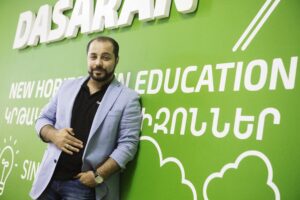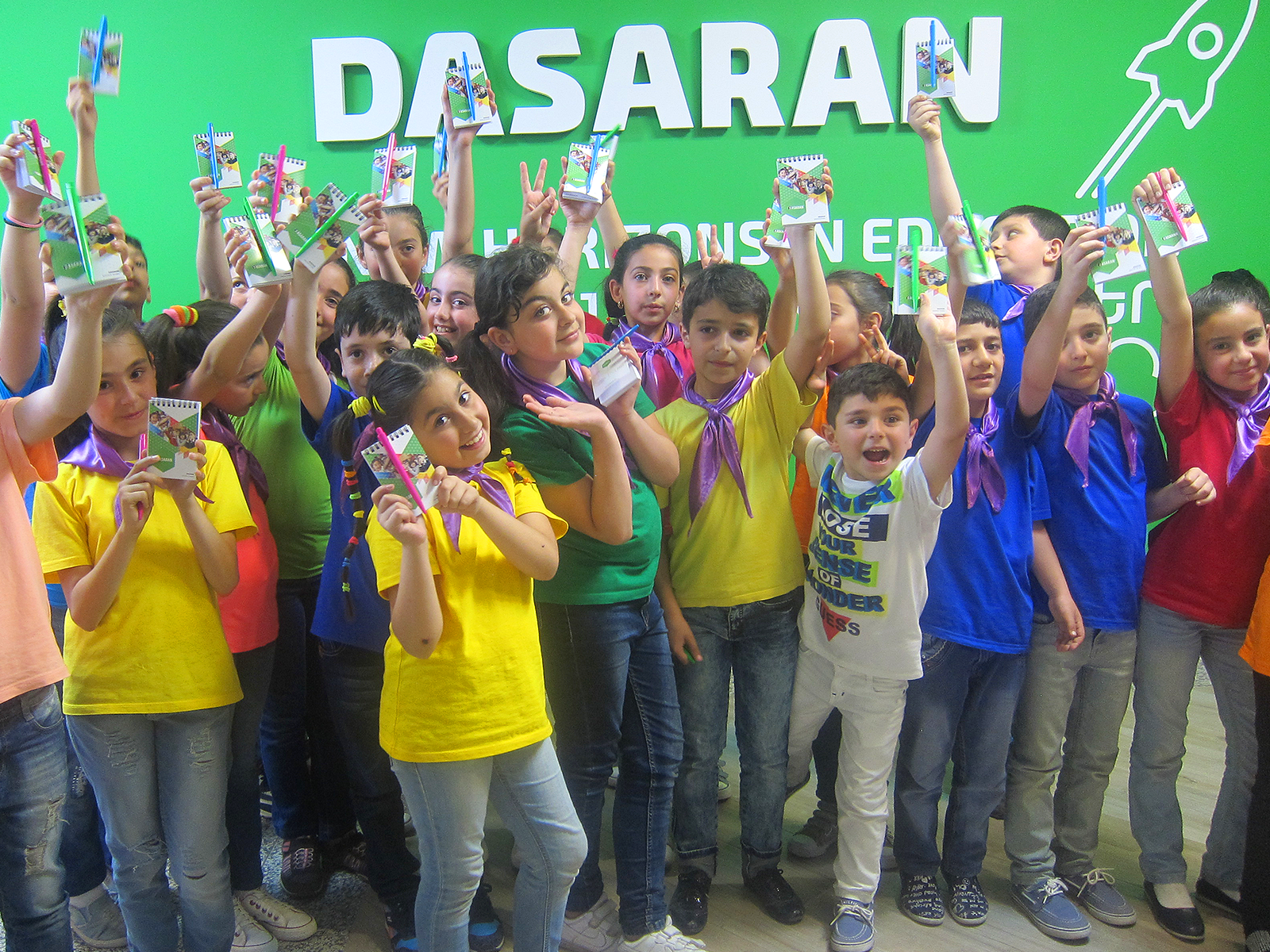According to UNICEF, nearly 50 million children have been uprooted across the globe. The UNHCR reports that 4 million children under their care are deprived of a basic human right – education. The recent refugee crisis has only compounded the lack of educational resources for children worldwide, especially across developing countries – including in Armenia where public spending on education is one of the lowest among OECD countries and where there’s a 35% dropout rate for students from economically challenged families.
“To reverse these education stats has always been the mission of social entrepreneurs in Armenia. So, in 2009, I decided to launch an EdTech platform to disrupt the public education ecosystem,” says Suren Aloyan, Founding President and CEO of DASARAN (which means “classroom” in the Armenian language). DASARAN is a cloud-based K-12 Educational Development System built entirely in Armenia, that has elevated the educational proficiency across the country while meeting educational-technological development goals as well as advanced evidence-based decision-making, improved student performance, and augmented teacher capacity.
DASARAN’s achievements have been applauded by UNDP which recognized the platform as one of the best technological solutions in the education field in Armenia. During the UNDP Accelerate2030 initiative supporting impact-driven ventures that contribute towards the achievement of the Sustainable Development Goals (SDG), DASARAN was hailed as one of the best 5 innovative enterprises in the world.

Photo credit: DASARAN
With 100 percent penetration into Armenia’s education system, the platform has more than 1 million users (K-12 students, parents, teachers, principals, and policy-makers) across the country – even in the most remote villages and rural areas. It has improved student performance by nearly 39.6%, decreased absenteeism by nearly 83.78% and elevated teacher’s computer and data literacy levels from 5% to 81%.
But it’s DASARAN’s unmatched E-STAT diagnostic tool – the development of which was funded by the European Union – that is most noteworthy. It provides real-time data analysis for data-based decision-making for administrators and policy-makers. With comprehensive insights into the education system the tool enables most effective monitoring of schools and more accurate measurement of education indicators that help identify gaps and challenges in the school systems, which Aloyan explains “allows for strategic planning, evidence-based educational decision-making, and investments on new policies and regulations based on trends and needs of the society and the economy.”
Aloyan hopes his E-STAT tool can be used by education ministries worldwide. The advanced, daily updated data-to-information and analytics system allows for high-level, data-driven decision-making that can result in comprehensive educational reforms in any country. National and local authorities responsible for education can use the data for efficient monitoring, diagnosis of critical conditions affecting educational outcomes, and for providing information essential for data-driven, informed policy decisions within the respective country’s education sector.
As an EdTech tool, DASARAN is also ideal for international organizations committed to ensuring refugee children are not deprived of deserved education. DASARAN’s social impact – providing affordable, high-quality innovative technologies for more efficient educational solutions – meets 3 UN Sustainable Development Goals: SDG 4 (Quality Education), SDG 9 (technology, Innovation, and Infrastructure) and SDG1 (No Poverty).
DASARAN’s educational modules, including gamified interactive learning content and communication channels, offer transparent and innovative performance management and data analysis to engage all those involved in the ecosystem of the education system, including:
- K-12 students – offered customized e-learning and gamified education approach to gain a knowledge base on a wide range of topics (human rights, energy conservation, constitutional rights, tolerance, disaster risk reduction, environmental protection, intercultural learning, etc.) – shaping their behavioral patterns of civil citizens.
- Parents – previously lacking access to critical information on their child’s education, advocate for school policy improvements, ensuring high-quality education while keeping schools and administrators accountable based on access to statistical data.
- Teachers – gain access, in a matter of seconds, to student learning plans based on data collection and processing, and with increased transparency help reduce corruption risks for stakeholders while promoting equal educational resources and opportunities for all students from cities to rural areas.
- School administrators and ministries of education – easily adjust E-STAT to incorporate additional filters and enact new correlations, decreasing the time for state-level data collection and processing to seconds, and correspondingly improve resource management. Increased transparency of schools contributes to decreased corruption risks and grade-modification practices.
Most recently, DASARAN launched its E-CULT system – developed in collaboration with the Armenian Ministry of Education and Science and the Ministry of Culture – the portal allows free access to students and teachers to 3 cultural institutions from a subscription list within an academic year. This access helps advance cultural knowledge base from theatrical performances to museum exhibits to various entertainment venues engaging young children in their country’s rich cultural heritage.
DASARAN’s future scaling plans include penetration into 3 countries in the next 3 years allowing school administrators and education ministries worldwide to subscribe and gain access to the platform with a user agreement which provides full access to all the resources.
“It’s crucial for school administrators and education ministries worldwide to have tools for evidence-based policy-making so they can implement targeted educational initiatives and engage their students and teachers in the digital transformation of education – they must be prepared with future-driven relevant skills and competencies,” emphasizes Aloyan whose cooperation with a multitude of international organizations from World Bank, UNDP, UNICEF, the European Union, to the U.S. Embassy, USAID, Save the Children, etc. helps DASARAN to drive educational and development content, creating an equally-accessible education environment.
One of such collaborative projects, involving the U.S. Embassy in Armenia and the Save the Children International Country Representation of Armenia, has been the creation of an interactive game called “DiverCity” which since its September 2017 launch has been played by 39,424 students for more than 105,800 times. The game is designed to integrate displaced Syrian children into Armenia’s public schools through promoting a tolerant and friendly environment in schools using DASARAN’s digital platform and tolerance education materials developed by Save the Children International.
“The educational content on DASARAN’s platform is without borders or national boundaries,” emphasizes Aloyan. “It provides knowledge that is global in nature and adaptable with the basic needs and requirements for any group of children – including displaced and refugee children. It also allows for unlimited new content to be added with modern, innovative, low-media-intensity and cost-efficient techniques and technology solutions that inspire continued growth for students to gain new sets of knowledge, information, and skills to be prepared for our digitized world, regardless of their socio-economic standing.”



